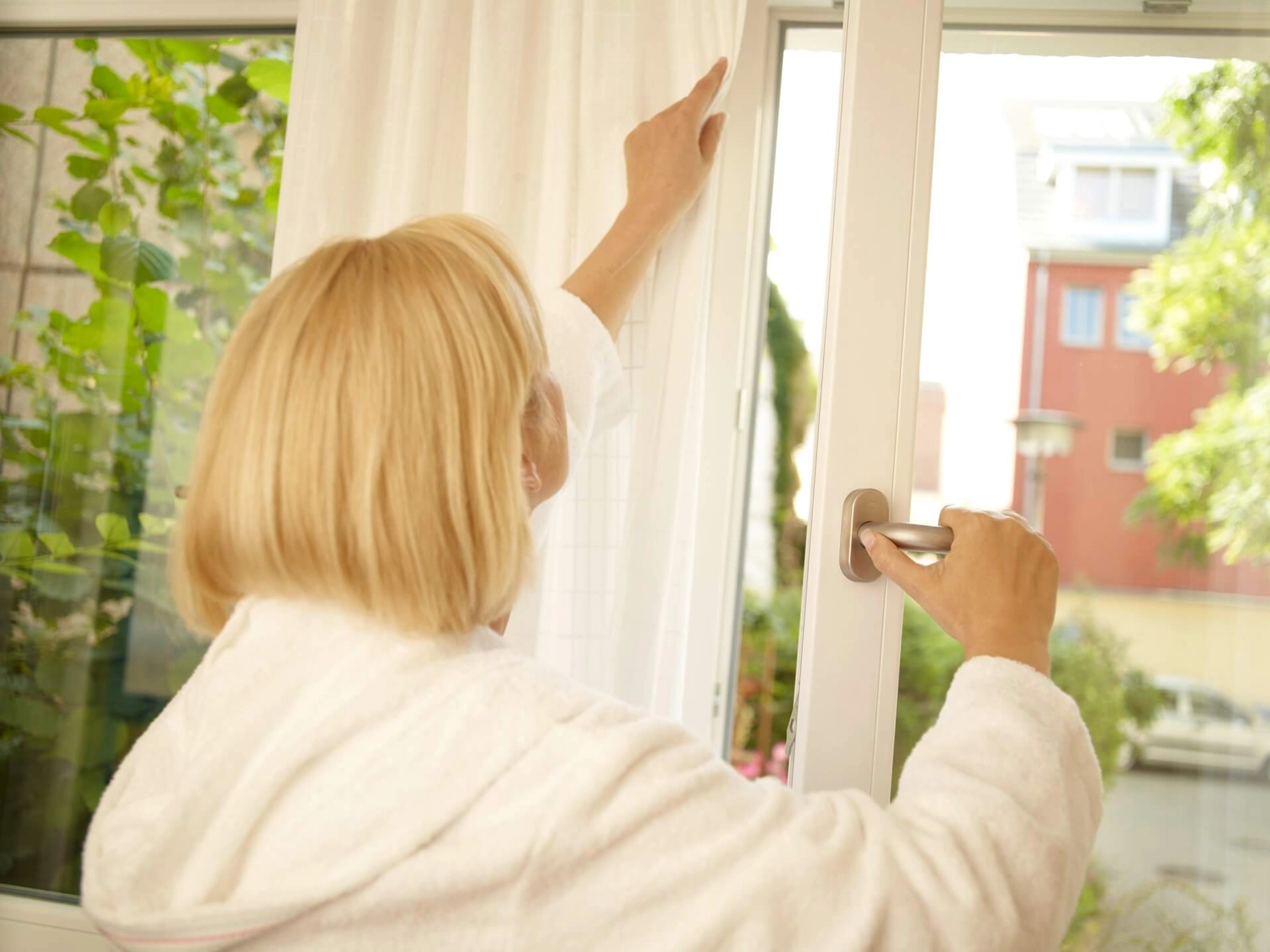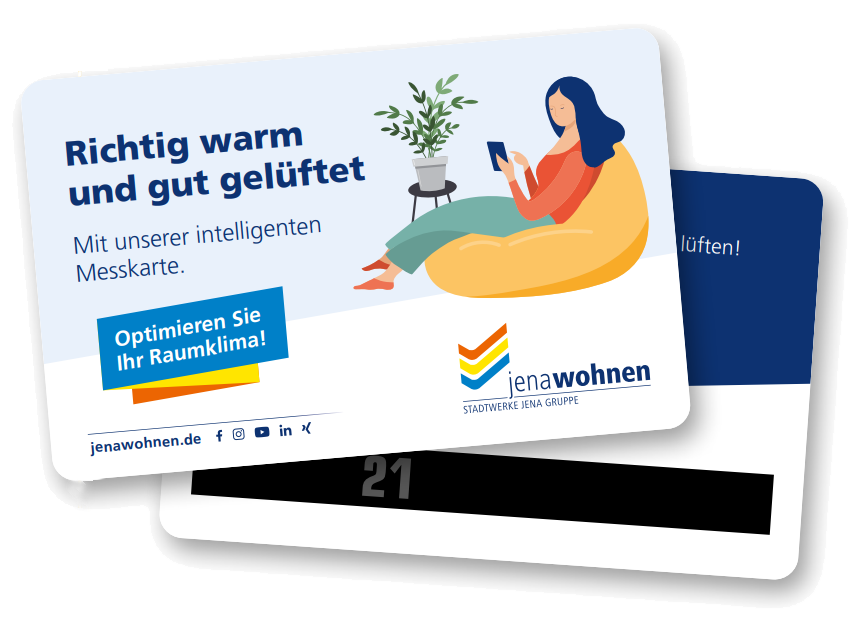Energy Situation
Development of the energy situation
Although we always strive to obtain favorable conditions for our tenants, the advance payments calculated to date will not be sufficient due to the increase in energy costs. To protect you from unpleasant financial surprises in the operating costs statement, an increase in the monthly advance payments is therefore necessary.
The current situation brings a lot of uncertainty and arises questions. We have answered the most important questions about cost development and technical adjustments below.
You would like to voluntarily adjust the amount of your operating costs? Then feel free to use our form.
Please note: Even we at jenawohnen currently do not have a precise answer to all questions and can often only work with estimates and forecasts . Please understand that all figures relating to cost development are based on assumptions only and may change as a result of new events. If we are able to provide more detailed answers, we will do so and inform you as soon as possible.
Also with regard to maintenance work on windows and radiators, we are currently receiving numerous inquiries. We will comply with these as quickly as possible.
FAQ about the energy situation
Information on the Erdgas-Wärme-Soforthilfegesetz (EWSG) (act on gas and heat emergency aid)
The Natural Gas Heat Emergency Relief Act (EWSG) came into force on 19 November 2022. The law specifically regulates how consumers are relieved of the costs for performance-based natural gas and heat for the month of December 2022. With the Act, the Federal Government assumes the costs for the December discount for gas and district heating in order to bridge the period until the gas price brake becomes effective. We hereby comply with the envisaged information obligations and inform you in particular about how the relief is to be passed on to you.
Information according to § 5 para. 2 EWSG
- District heating supply: Stadtwerke Energie Jena-Pößneck has informed us that a one-off relief will be granted in December 2022 in accordance with Section 4 (1) EWSG in the total amount of EUR 816,000 for all withdrawal points of jenawohnen GmbH.
- Central gas supply: Stadtwerke Energie Jena-Pößneck has informed us that the relief for December will take place with the year-end statement for 2022. The exact relief amounts for each building have not yet been determined.
- We will take the calculated relief amounts into account in the heating cost statement for the 2022 billing period to reduce costs and show them separately according to your share and pass them on to you in full.
- The relief is financed from federal funds.
Information according to § 5 para. 4 EWSG
- Tenants whose heat prepayments were increased during the last nine months before 19 November 2022 due to the rising costs for piped natural gas and heat are exempt from paying this increased amount in the month of December.
- New tenants (movied in during the last nine months) are allowed to reduce a flat rate of 25% of the advance operating cost payments for the month of December 2022.
We would like to point out that the reduction of the December advance payment allowed by law does not constitute a credit or exemption from heating costs and does not apply automatically.
In order to avoid a payment reminder, you should inform us immediately in written form about the enforcement of your right on reduction.
As the use of this one-time exemption option may lead to increased additional payments in the 2022 operating costs statement, we recommend that you renounce.
Further information is available here:
Information Stadtwerke Energie Jena-Pößneck
FAQ about the energy situation
Costs
No, because the relief will be passed on by jenawohnen with the next heating cost statement in 2023.
As district heating is generated to approx. 95 % by gas, it is also affected by the price increase. Currently (as of October2022), we are assuming an increase of around 70 % for the year 2023.
Yes! This is because the gas price brake does not absorb 100% of the energy costs and, on the other hand, the costs depend on your consumption. In addition, it is impossible to predict how gas prices and other costs will develop.
For this reason, we recommend that you increase your monthly prepayments accordingly in order to prevent a potential additional payment and to continue to integrate energy-saving measures into your everyday life.
If you would like to increase your advance payments, you can use our form for operating cost adjustment.
As landlords, we are also affected by the rise in energy prices. In order to spare you unpleasant surprises, we increase the advance payments for operating costs as part of the operating cost statements.
In addition, you have the option to adjust your advance payment at any time. Please note that the amount may not be lower than the amount you currently pay.
At present, we cannot make a precise statement about what the optimal increase in your service charge advance payment might be. This is very individual and depends, among other things, on your consumption, flat size and number of occupants.
Based on the costs for 2022, we can give you an increase in the service charge advance payment of 50% - 70% as a basis for assessment. Please note that this is a very rough guideline that can change very quickly due to the current situation (as of October 2022).
If you would like to increase your advance payment of service charges, you can send us your request for adjustment by e-mail to betriebskosten@jenawohnen.de, or fill out our contact sheet.
An increase is also expected in the cold operating costs. This is due to the higher minimum wage and the increase in prices of material and transport costs of service providers, among other things.
Explanation: In the case of operating costs, a distinction is made between so-called cold and warm costs. Warm operating costs include consumption-dependent components such as hot water or heating. Cold operating costs include, among other things, the cost of maintaining the green areas, maintenance of elevators or lighting the stairwell. You will find the exact breakdown of the cost items in your operating costs statement.
We are aware that the current situation is a particular challenge for many households. As a general rule, no one will lose their flat with jenawohnen because of the current increase in service charges. If you are affected or find yourself in a difficult economic situation for other reasons, please contact us immediately.
Together, we will discuss the possibilities (entitlement to housing benefit or other social benefits, offers from associations and social institutions, instalment payments, etc.) and find a suitable solution!
You can reach us per e-mail at soziales@jenawohnen.de or recht@jenawohnen.de.
The billing is based on the individual consumption of the tenants. The size of the flat and the number of residents also influence the costs. If consumption is higher, the costs are adjusted upwards accordingly. As a result, the advance payment can vary.
If you are looking for a smaller or cheaper flat due to the increased costs, please fill out our form for prospective tenants and book an appointment with our advisory team at the same time. We will try to support you in your search as best we can.
Technical issues
Fan heaters and radiators require a lot of electrical energy. Since the kilowatt hour of electricity is significantly more expensive than district heating or natural gas, the costs cannot be reduced by the additional use of fan heaters or radiators. Moreover, these devices are usually not designed for permanent use. Also, the high power consumption of 2000W can overload the house installation and, in the worst case, even the power grid. For these reasons, we advise against the use of fan heaters and radiators.
The heating thermostat is a controller with which the room temperature can be influenced via the flow rate of the hot water. Depending on the setting, a certain amount of heating water flows through the radiator when the thermostat is opened. When the set room temperature is reached, the valve of the heating thermostat closes and thus reduces the flow rate of the heating water until the valve is completely closed. If the room temperature drops, the valve opens again until the desired or set temperature is reached.
On most manual heating thermostats, the levels 1 to 5 are shown. In addition, there are symbols such as the star or the snowflake for the frost protection setting. Depending on the level, you select your desired temperature. Increasing one level corresponds to a temperature difference of 3 to 4 degrees Celsius more.
Feel free to check the room temperature with a thermometer if necessary.
Yes, the flow temperature of the heating system is adjusted to the outside temperature over the course of the year to save energy.
The water temperature is not regulated down by jenawohnen. The reason for this is that legionella can form at lower water temperatures. To avoid this, the hot water pipes and the hot water tank must be regularly flushed with hot water in order to kill any legionella that may form and to ensure the quality of the drinking water in the long term.
Tip: You can save hot water, for example, by showering less frequently or for a shorter period of time.
Explanation: Legionella are bacteria that can form in tap water. This occurs, for example, if the hot water temperature is permanently too low or if stagnation occurs in the pipe system due to non-use of taps. Legionella are inhaled as aerosol and can lead to abdominal pain, diarrhoea or pneumonia, among other things. At jenawohnen, the hot water pipes and hot water tanks are regularly tested for legionella in accordance with legal regulations.
You can find more information here: Legionellen - infektionsschutz.de
If the radiator is not sufficiently warm or makes bubbling noises, then a check of the heating system is necessary. Usually, the reason for the reduced heating output is air in the radiator.
We would like to ask you not to ventilate your radiators yourself at first! This is because the pressure in the heating system should be checked both before and after the ventilation and, if necessary, water should be added. In an apartment building with central heating, this requires consultation with us as the landlord, because tenants cannot check and readjust the heating pressure themselves.
If you have problems with your radiator, contact your tenant advisor.
Draughty or defective windows can have a negative effect on the room temperature and unnecessarily drive up heating costs. However, draughts are not always caused by windows that do not seal properly.
Some windows have technically necessary and deliberate air supply openings, e.g. systems such as Regelair. These supply air openings are necessary for the operation of the exhaust air systems in the bathrooms. The energy loss due to intentional ventilation is necessary and very low. The intended ventilation openings are important for the indoor climate and must not be closed. Otherwise, mould formation in the flat is encouraged.
Wear and tear and/or temperature fluctuations mean that maintenance or repairs to the windows may be necessary. If you suspect that your windows are leaking or defective, please feel free to fill out our contact sheet „report damage” or contact your tenant advisor. Our caretakers will look at your windows promptly and discuss further measures with you.
Tip: Place a sheet of paper between the window and close it. Can you pull out the sheet of paper while it is closed? If so, the seals may need to be replaced.
Misted windows or windows on which condensation has already formed are always a sign of warm, humid air in the flat. To avoid this, you should ventilate regularly. Open the windows for 10 to 15 minutes in the morning and in the evening. A tilted window is not sufficient.
If condensation has formed, wipe it off with a dry cloth to prevent mould from forming in the joints and surrounding wallpaper.
8 useful tips on how to save energy & costs
filter_1
Regulate room temperature down
If you reduce your usual room temperature by 1 degree, you will lower your energy and heating costs by about 6 percent. Small and hardly noticeable changes – large saving effect!
filter_2
Keep radiator clear
Furniture, coverings or curtains directly in front of the radiators reduce the effectiveness of the heating and thus increase the costs!
filter_3
Turn thermostats low
When leaving the apartment and in case of longer absence, do not leave the thermostats completely closed, but one level lower. This saves energy, but at the same time prevents the apartment from cooling down completely.
filter_4
Protect from drafts
Do you have windows or an apartment door that are a bit drafty? Just put a draft stopper in front of the gap. Those who have exterior blinds should leave them down at night – that insulates additionally.
filter_5
Unplug devices from the mains
Always turn off electrical appliances completely - the stand-by mode consumes a lot of electricity (on the TV, for example, 36 euros per year). This applies especially to cell phone chargers, which are always connected to the power grid!
filter_6
Avoid washing with boiling water
With today's good detergents, 40 degrees is usually enough, often even 30! If the washing is not too dirty, you can save a lot of energy in this way. And please only turn on the machine when it is really full. This also applies to the dishwasher!
filter_7
Check cooling devices
In the freezer minus 18 degrees, in the refrigerator plus 8 degrees - completely enough. Each degree less costs! Also important: Iced freezers consume enormous amounts of electricity. Therefore defrost regularly!
filter_8
No mobile heaters
The devices may overload the electrical system, are not efficient and consume extremely high amounts of electricity.

Feel-good tips
In the cold season, there is often too much moisture in the apartment due to insufficient ventilation, which can lead to discomfort, mold and even structural damage.
To save energy, it makes sense to lower the room temperature slightly. Nevertheless, you should not forget to air regularly to let out moist air. Simply open the windows wide for several minutes in the morning and evening to replace stale air with fresh air. At the same time, the thermostatic valves should be turned down briefly.
How to heat and air properly
- During the heating season, always air briefly and strongly with windows wide open.
- In winter, air at least three times a day for three to a maximum of five minutes to avoid cooling down the rooms. It is necessary to air additionally if you have an increased moisture input, such as after cooking etc.
- Airing no matter what weather! Cold air is always dry – even in „wet-cold“ weather.
- Airing by tilting the windows in winter is to be avoided at all costs. Due to airing through a gap only, the window wall cools out considerably and the room moisture is deposited on it. Thus, moisture related damages can occur, which can lead to mold.
- Misted windows and moisture on the window sill are a visible sign for an inadequate ventilation of the rooms.
- Even if you are not there during the day – never turn off the heating completely! Constant cooling and reheating is more expensive than maintaining a lowered temperature.
- Keep the doors of differently heated rooms closed. The incoming air from warmer rooms causes condensation in the cooler room
Feel-good card
Two different measuring fields are shown on the "jenawohnen feel-good card". The membrane measuring field changes colour depending on the humidity in the room. Purple stands for an optimal room climate; if the measuring field turns pink, then the humidity is increased. Another measuring field indicates the temperature. The humidity and temperature in the room can be optimised by appropriate heating and ventilation.
Our feel-good card makes it easier for you to heat and ventilate correctly by measuring the humidity in the room. jenawohnen tenants can obtain the card free of charge at all service centres!


